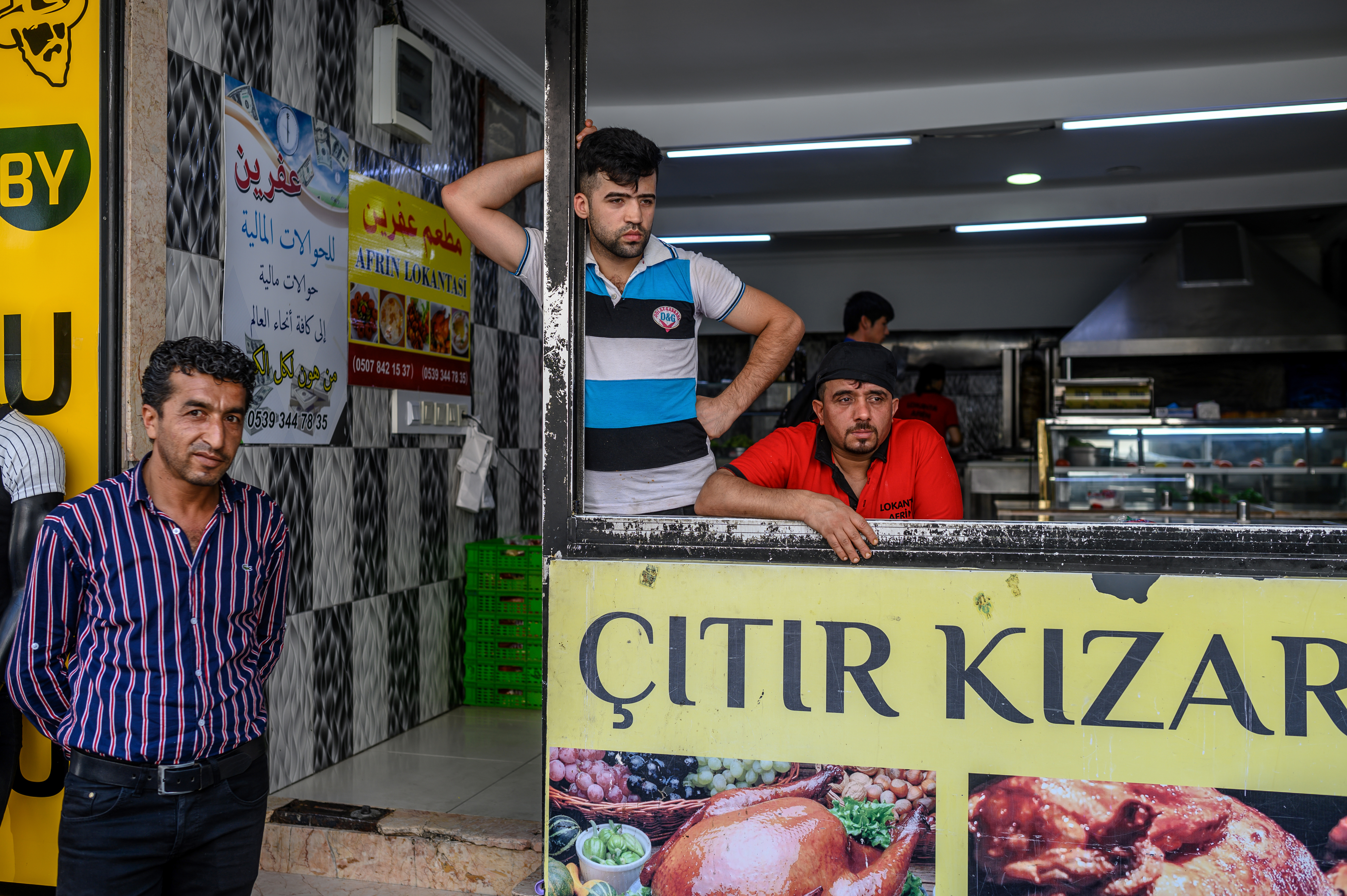
Employers who work for a Syrian restaurant named Afrin Restaurant stand in front of a damaged restaurant in Istanbul’s working-class district of Kucukcekmece on July 5, 2019. – The most recent violence against Syrians in Kucukcekmece 10 days ago has raised fears of an escalation in an already volatile climate. Xenophobic language has been unleashed, particularly during the campaigns for local elections. Turkey is home to the largest number of refugees in the world, having welcomed over 3.5 million Syrians — including 500,000 in Istanbul — who were forced to flee their country. (Photo by BULENT KILIC / AFP)
ISTANBUL — Ahmad Yassine was working in his barbershop in Istanbul’s working-class district of Kucukcekmece when he saw an angry crowd gather. Then they attacked his business and others owned by Syrians.
“They threw stones, the window was completely shattered. There was three of us inside, we were scared,” the young man who fled from Aleppo six years ago told AFP.
“We were not able to leave before midnight, one in the morning,” he added.
The most recent violence against Syrians in Kucukcekmece 10 days ago has raised fears of an escalation in an already volatile climate. Xenophobic language has been unleashed, particularly during the campaigns for local elections.
Turkey is home to the largest number of refugees in the world, having welcomed over 3.5 million Syrians — including 500,000 in Istanbul — who were forced to flee their country.
But this welcome, which Ankara hoped would be temporary, has been extended as the economic situation in Turkey has significantly worsened.
And so the hosts’ hospitality has been put to the test.
A study by Istanbul’s Kadir Has University last week showed that the share of Turks unhappy with the presence of Syrians rose from 54.5 percent in 2017 to 67.7 percent in 2019.
Turks and Syrians live together in an often precarious situation. The violence began in Kucukcekmece because of a rumor — denied by police — that a young Syrian boy had verbally harassed a young girl.
The aftermath of the violence is still visible: shop windows have been patched up temporarily with tape and signs hang from their wires.
Mohammad Amari, a 27-year-old Syrian who fled Damascus seven months ago, discovered the day after that the bakery where he worked had been ransacked.
“They broke the shop window using stones and bats,” he said.
‘Scapegoats’
While the incident in Kucukcekmece is not isolated, there has never been violence of this magnitude, according to residents. Police had to use tear gas grenades and water cannon to disperse the crowd.
Although he is Turkish, Esat Sevim’s restaurant was also vandalized.
His crime? Employing Syrians.
“If one finds a dead cat in the street, there will be someone who says that a Syrian killed it,” he said. “We must stop scapegoating them.”
With the economy slowing down, double-digit inflation and high unemployment, Syrians are often targeted.
Even if he does not condone the violence, Murat, a worker who lives in Kucukcekmece, wants Syrians to return home because “our youth cannot find work anymore”.
Politicians have also been accused of heightening tensions during the local election campaigns, before the March 31 vote and the rerun Istanbul mayoral election on June 23.
The newly elected Istanbul mayor from the secular opposition party, Ekrem Imamoglu, was criticised for focusing on the number of shop signs in Arabic in some districts.
“This is Turkey, this is Istanbul,” he said last week.
During the campaign, the hostility towards Syrians came to a head-on social media, with the hashtag, #SyriansGetOut.
Hunting signs
President Recep Tayyip Erdogan’s government — who welcomed Syrians in the name of “Muslim solidarity” — now seeks to take a tougher line after accusations of softness.
Interior Minister Suleyman Soylu on Saturday said no more Syrians would be able to register as residents in Istanbul.
And the Istanbul governor’s office last week ordered 700 Syrian traders to remove their signs in Arabic and replace them with the Turkish language.
But most Turks with whom AFP spoke in Kucukcekmece sought to downplay the recent incidents and called for solidarity.
Ahmet, a Turkish fruit and vegetable seller in the area where the shops were attacked, stepped in to protect a Syrian-owned shop by posing as the owner during the violence.
“If they don’t want Syrians, let them set up a petition and go see our president. But it is useless to cause destruction and to vandalize,” he said.
Given the current climate and the recent violence however, Yassine fears things will get worse.
“This time, they only attacked with stones,” he said. “But who knows if one day they will not attack me with weapons?” /muf